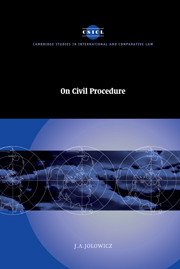Book contents
- Frontmatter
- Contents
- Preface
- List of abbreviations
- Introduction
- I The litigation process
- II Protection of diffuse, fragmented and collective interests
- III Procedural modes
- IV The parties and the judge
- 10 Da mihi factum dabo tibijus: a problem of demarcation in English and French law
- 11 Fact-finding
- 12 The expert, the witness and the judge in civil litigation: French and English law
- 13 The use by the judge of his own knowledge (of fact or law or both) in the formation of his decision
- V Recourse against judgments
- VI Procedural reform
- Index
- CAMBRIDGE STUIDES IN INTERNATIONAL AND COMPARATIVE LAW
11 - Fact-finding
from IV - The parties and the judge
Published online by Cambridge University Press: 18 December 2009
- Frontmatter
- Contents
- Preface
- List of abbreviations
- Introduction
- I The litigation process
- II Protection of diffuse, fragmented and collective interests
- III Procedural modes
- IV The parties and the judge
- 10 Da mihi factum dabo tibijus: a problem of demarcation in English and French law
- 11 Fact-finding
- 12 The expert, the witness and the judge in civil litigation: French and English law
- 13 The use by the judge of his own knowledge (of fact or law or both) in the formation of his decision
- V Recourse against judgments
- VI Procedural reform
- Index
- CAMBRIDGE STUIDES IN INTERNATIONAL AND COMPARATIVE LAW
Summary
Introduction
It has been rightly said that lawyers must learn to appreciate some of the more basic assumptions that are made by their counterparts in other countries and of the consequences of them. Common lawyers must not, of course, fall into the trap of supposing that all continental systems are the same, but Western European countries do have a common heritage in the Romano-canonical procedure of Byzantium. This makes it possible to differentiate on a broad scale between common law and continental systems and to suggest that, in terms of assumptions, the fundamental difference is that the common law system assumes that there will be a trial while the continental assumes no such thing. In other words - and it really is ‘in other words' - the fundamental division between the two principal families of procedural law of the Western world is that between those legal systems which do - or did in the past -make use of the civil jury and those to which the civil jury has always been unknown.
The significance of this to the fact-finding process as such lies in the fact that the members of a jury can be brought together only for a single session; once it came to be settled that the jury must decide on the basis of materials presented to it in court - largely, if not entirely, by word of mouth – the essential characteristic of the trial was established.
- Type
- Chapter
- Information
- On Civil Procedure , pp. 205 - 221Publisher: Cambridge University PressPrint publication year: 2000



